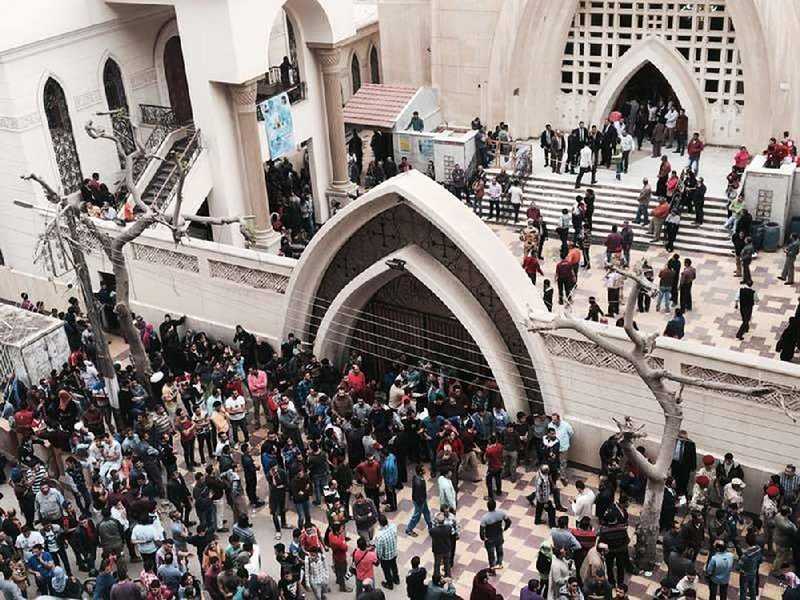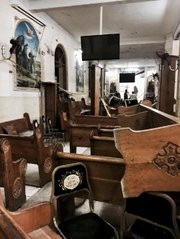TANTA, Egypt -- Bombs exploded at two Coptic churches in different cities in northern Egypt as worshippers were celebrating Palm Sunday, killing at least 44 people and wounding at least 126 others in an assault claimed by the Islamic State extremist group.
In response, Egyptian President Abdel-Fattah el-Sissi declared a three-month state of emergency and created a powerful anti-terrorism agency with the authority to "adjust the whole situation, whether it's related to the media, the judiciary, legal and religious discourse," he said.
The blasts came at the start of Holy Week leading up to Easter, and just weeks before Pope Francis is to visit the Arab world's most populous country, which has been beset by extremist violence against its minority Christians.
In the first attack, a bomb went off inside St. George's Church in the Nile Delta city of Tanta, about 80 miles north of Cairo, killing at least 27 people and wounding 78 others, officials said.
A few hours later, a suicide bomber rushed toward St. Mark's Cathedral in the coastal city of Alexandria, the historic seat of Christendom in Egypt, killing at least 17 people and wounding 48, the Interior Ministry said. Pope Tawadros II, the leader of the Coptic church, was in the Alexandra cathedral at the time of the bombing but was unhurt, the Interior Ministry said.
The timing of the attack raised the question of whether the bomber had sought to assassinate the Coptic leader.
The Islamic State claimed both attacks via its Aamaq news agency.
Brig. Gen. Hossam Elddin Khalifa, a regional police chief, was fired over the Tanta bombing, with Maj. Gen. Tarek Hassouna replacing him, state-run newspaper al-Ahram reported.
Pope Francis, marking Palm Sunday in St. Peter's Square in Vatican City, decried the bombings, expressing "deep condolences to my brother, Pope Tawadros II, the Coptic church and all of the dear Egyptian nation."
He is scheduled to visit Egypt and Pope Tawadros II on April 28-29.
President Donald Trump tweeted that he is "so sad to hear of the terrorist attack" against the U.S. ally but added that he has "great confidence" that el-Sissi "will handle the situation properly." The two leaders met at the White House on April 3.
Grand Sheikh Ahmed el-Tayeb, head of Egypt's Al-Azhar -- the leading center of learning in Sunni Islam -- also condemned the attacks, calling them a "despicable terrorist bombing that targeted the lives of innocents."
Both Israel and the Islamic Hamas movement, which rules neighboring Gaza, condemned the bombings as well.
Tanta attack
Susan Mikhail, whose apartment balcony across the street from the church in Tanta has a clear view of the church and its front yard, said the explosion at 9:30 a.m. Egyptian time Sunday violently shook her building.
"Deacons were the first to run out of the church. Many of them had blood on their white robes," she said, referring to the lay Christians who help with the service. Later, those who were more seriously wounded were carried out by other survivors and taken to hospitals in private cars, she said.
Hundreds of residents gathered in the area, and church members blocked people -- including journalists -- from entering the church as police cordoned off the area.
"I ran to the church to find my lifelong friend shattered to pieces by the bomb," said Mona Faiez, 61, who lives near the church. Her friend, Soliman Shaker, was a church deacon.
"What kind of human could do this and why?" she asked.
Remon Emaad said the church had been on alert since authorities recently discovered an explosive device nearby and defused it.
Soia Williams said her uncle, Methat Moussa, a retired army officer, had been late to Sunday's service and had gone to the front pews, where the explosion went off.
"We can't find his body, just a bloodied identity card," she said.
Residents in the city wondered how someone was able to get a bomb into the service.
Concerned about more attacks on Christians, local authorities appeared to have taken no chances on this holy day.
Police officers were present, and security appeared tight, said witnesses.
For Faiez, that only raised more questions.
"The head of the security here told me he had seven policemen standing here to protect the church," said Faiez. "What exactly were they doing? How futile!"
Targeting civilians
Kamil Sadiq Sawiras, a Coptic church official in Alexandria, said a police officer at the gates of St. Mark's Cathedral had intercepted a suicide bomber, who blew himself up before he could reach the church.
Two police officers and a neighborhood police chief, Adel El-Rakiby, were among the dead.
Surveillance images broadcast on Egyptian channels showed a man in a blue pullover approach the main gate to St. Mark's. The man was turned away and directed toward a metal detector. The man then passed a female police officer and another woman, and entered a metal detector before an explosion engulfed the area.
The bombings added to fears that Islamic extremists who have long been battling security forces in the Sinai Peninsula are shifting their focus to civilians.
Militants recently released a video vowing to step up attacks against Christians, whom they regard as "infidels" empowering the West against Muslims. Christians make up about 10 percent of Egypt's population.
Egypt has struggled to combat a wave of Islamic militancy since the 2013 military overthrow elected Islamist President Mohammed Morsi.
The Sinai-based Islamic State affiliate has mainly attacked police and soldiers but has also claimed bombings that killed civilians, including the downing of a Russian passenger jetliner in the Sinai in 2015, which killed all 224 people aboard.
The head of the Catholic Church in Egypt, Bishop Emmanuel, told reporters on Friday that the visit from Pope Francis later this month is meant to send a message that Egypt is safe to visit.
Egypt's Copts make up one of the oldest Christian communities in the Middle East. They have long complained of discrimination and said the government does not do enough to protect them. Sunday's blasts came months after a bomb ripped through a section reserved for women at Cairo's main Coptic cathedral during a morning Mass, killing about 30 people.
The Copts were largely supportive of the military overthrow of Morsi and incurred the wrath of many of his followers, who attacked churches and other Christian institutions.
While the Copts have stood alongside Egypt's government, repeating the mantra that Egyptians were all being targeted by terrorists, an increase in attacks on Christians has tested that support.
Outside the Tanta hospital, 27-year-old carpenter Maged Saleh flew into a rage as blood streamed from his arm after he and his mother escaped the explosion.
"Where is the government?" he screamed at onlookers. "There is no government!"
Information for this article was contributed by Hamza Hendawi, Maamoun Youssef, Maggie Michael, Menna Zaki, Brian Rohanand Bassem Mroue of The Associated Press; by Tarek El-Tablawy, Ahmed Feteha and Abdel Latif Wahba of Bloomberg News; by Heba Mahfouz and Sudarsan Raghavan of The Washington Post; and by Magdy Samaan and Declan Walsh of The New York Times.
A Section on 04/10/2017


